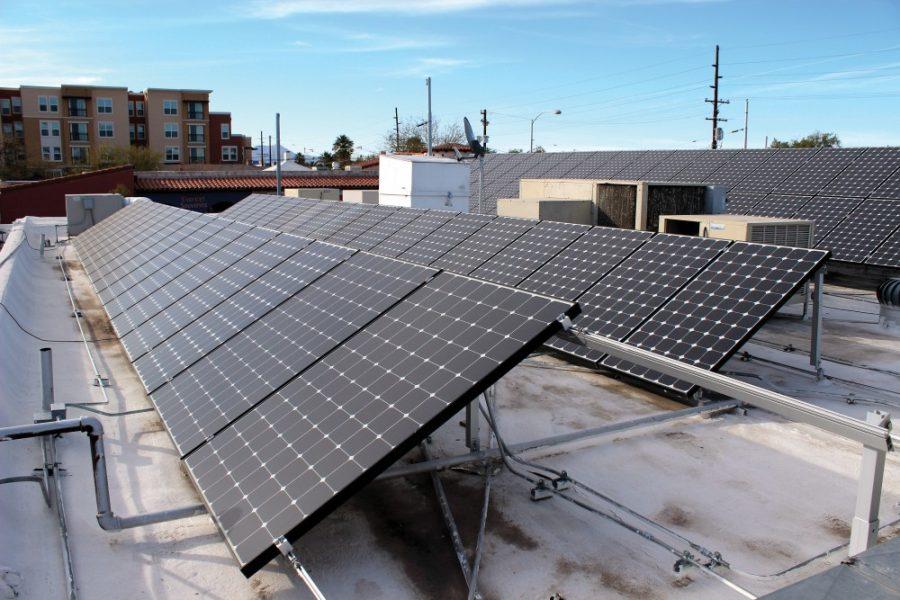Before the new year, the Arizona Corporation Commission voted 4 to 1 to end the practice of net metering by Arizona utility companies.
Previously, Tucson Electric Power would buy excess power produced by local consumers with solar panels at the retail price, under the net metering rules established in 2009.
TEP will now pay consumers a lower export rate for the excess power they produce instead.
TEP argued rooftop solar customers did not pay their fair share of fixed grid costs. In the old system, TEP believed non-solar customers were disproportionately burdened with these costs.
Former Corporation Commission Chairman Doug Little hailed the adoption of the new policy in an Arizona Corporation press release on Dec. 21.
In the release he said he believes it simultaneously protects the current investment of solar customers, while also more fairly distributing the cost of power between energy-producing and non-energy producing customers within the current market.
Consumers with solar panels installed at the time of this decision will continue to receive the benefits of net metering for the next 20 years.
Those who install solar panels after the decision will have an export rate calculated and fixed for 10 years.
Consumers will also be credited daily for excess energy, instead of the old monthly banked credit system.
RELATED: Republicans take hold of Arizona Corporation Commission in close race
The commission will be responsible for approving export rates for each state-regulated utility’s rate cases.
The rates will initially be based on an approximated five-year cost of solar energy from an industrial solar farm.
In the future, utilities will be required to develop five-year cost avoidance analyses based on conventional production, to determine the export rates provided to consumers. Export rates cannot decrease more than 10 percent each year.
Tom Forese will serve as the body’s chairman in 2017, with Boyd Dunn replacing Bob Stump as the commission’s fifth member. The board is currently composed of five Republicans serving four-year terms.

Commissioner Bob Burns cast the sole vote against the decision. Burns, in his written dissent submitted Jan. 3, said he was concerned the commission did not factor in all potential benefits from individual solar investment, including the potential environmental impact.
also said he believes export rates should be fixed for 20 years, or at least the average lifespan of a solar panel, as argued by local Arizona businesses, instead of only 10 years.
Solar is now a much less appealing investment, said Remington Franklin, a UA geography graduate student.
Russell Lowes, Energy Committee Chair at the Rincon Group, said the Arizona solar industry will reel from solar customers’ increased energy cost produced by this decision.
Salt River Project, a power provider in Phoenix, observed a 95 percent reduction in applications for rooftop solar panels after a similar decision, Franklin said.
Lowes said promoting demand-side energy management is the most economically and environmentally friendly policy for Arizona.
RELATED: Corporation Commission candidates talk solar energy and dark money
Because of this decision, Lowes said he foresees thousands of potential job losses within the state solar industry.
He said the corporation commission unfairly argued that solar customers placed a heavier financial burden on non-solar consumers.
When non-generation costs such as transmission and distribution are factored into the cost of centralized solar, the consumer rooftop solar generation ends up more cost effective for the utilities, according to Lowes.
Before the decision, Lowes said he organized a protest against this change in Tucson, that the UA Students for Sustainability attended.
Lowes said he will now continue to promote the interest of all consumers and the environment at all upcoming rate cases.
During the protest, UA environmental studies senior Diego Martinez-Lugo, who serves on the UA Students for Sustainability Energy and Climate Committee, said continuing to rely on coal and natural gas threatens our water, air and public resources.
Former Commissioner Bob Stump disagreed.
“To have maintained status quo would have made the industry, long term, less competitive, and less self-reliant,” Stump said in an ACC Dec. 21 press release.
TEP also has asked the commission to allow a 70 percent increase in fixed cost and a seven percent increase in hourly rate to take effect this month along with the new export rate regulations.
Little said it is impossible to satisfy everyone and that the policies laid out are probably not perfect.
He said he does believe a reasonable balance was established, laying the groundwork for future steps.
Follow Randall Eck on Twitter.









